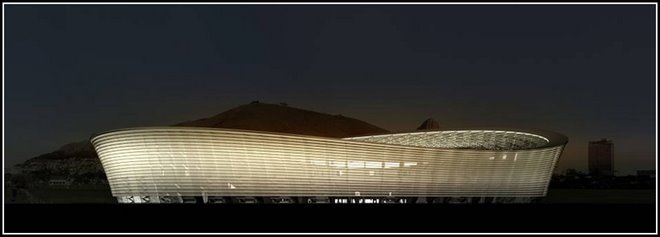
Cape braces itself for 200 000 soccer fans
By Anel Powell
Cape Town must "brace itself for an influx of at least 200 000 football fans" during the 2010 World Cup, says MEC for Transport and Public Works Marius Fransman - four times the number originally predicted.
But he is confident the city's transport infrastructure will cope. "Funding is on track and the World Cup transport can happen."
The visitor numbers will give an indication of how much investment is needed to upgrade transport and meet accommodation needs.
| 'This is an exciting prospect and also a major challenge' |
"This is an exciting prospect and also a major challenge," said Fransman. He said work had already started on several of the transport upgrade plans.
"All key projects are either on stream or the design has been completed."
These include the widening of lanes on the N1 and N2 and the extension of the Khayelitsha rail corridor by 4.5km.
He said R450-million had been allocated for the Koeberg interchange.
| The city will host eight games and a semifinal |
"The increasing reliance on road transport, the poor state of public transport and the dramatic increase in car ownership combined to make the Koeberg interchange one of the most pressing problems in the city and it deserves urgent attention.
"We are glad that it is to receive priority treatment, but at the same time we are concerned about possible delays to other projects."
Fransman said other critical projects, such as the N1 bus lane, would start even if there was not yet funding for them.
About R1,9-billion has been allocated by all three spheres of government to improve Cape Town's transport infrastructure.
The long-awaited public transport operating entity, that would allow for the integrated management of road and rail transport, has been endorsed "in principle" by national government, said Fransman.
He said the agreement between the city and province would be signed by the end of May. "We've created the institutional mechanism for cooperation to happen."
The city's transport portfolio committee meets today to discuss 2010 transport projects. Rail, as a high capacity public transport system, has been identified as a critical focus area.
The R60 million upgrade to Athlone, Heideveld and Langa stations is expected to start in August.
The visitors' survey, done by transport specialists Axios Consulting, shows that the 50 000 estimated last year was a gross underestimation of the number of people expected to be in Cape Town during the 2010 event.
Fransman said 40 000 of these visitors would be from other African countries.
During the peak period, between the eighth and 14th day of the World Cup, the city's hotels and registered accommodation facilities will have to handle an average of 125 000 overnight stays. This excludes the 10 000 media representatives expected in the city during that time and the people who will stay with friends or family.
The city will host eight games and a semifinal during the World Cup.
Lillie said the English Football Association had already indicated that it would base its team in Cape Town, a "major economic coup" for the city.
"As a department we want to give the assurance to international teams that we will be able to offer a world-class transport system in a safe environment," Fransman said.
Lillie said the official fan park in the CBD would be on the Grand Parade, while three others have been proposed for Philippi, Athlone and Bellville.
These fan parks would be built to take traffic away from the central city.
Richard Gordge, director of Axios Consulting, said national travel demands during 2010 would depend on the match schedule.
He said the study, which was done in interviews with the supporters' associations of major teams, hoteliers and airport officials and in online surveys, showed strong local support for the hosting of World Cup matches in Cape Town.
"It is sad that a small number of people who are opposed to the tournament have been hogging all the headlines in the Western Cape, even though the majority of local people want Cape Town to be a key World Cup venue," Fransman said of the latest legal challenge against the building of the stadium.
Meanwhile, the city's mayoral committee on Wednesday approved a recommendation to recognise the Metropolitan Road Traffic Management Co-ordinating Committee as the co-ordinating structure for road traffic management.
- This article was originally published on page 1 of The Cape Times on April 05, 2007

No comments:
Post a Comment